Alexander Campbell and Isabella McDonald were my paternal grandfather's paternal grandparents. Alexander and Isabella were both born in
Scotland and migrated to Australia. In Australia they met, married, had children, and lived out their long lives.
Contents
The Campbell family in Scotland
The Second Statistical Account for Lochcarron
There is seldom a chimney to the houses. The fire is kindled alongside of the wall, or a stone in the centre of the room, and the
smoke reeks its way out at the roof, or door, or windows. [...] The floors are of clay and mud. In many houses, the cattle are under
the same roof, and even enter at the same door with the family, and are only separated from them by a partition of boards, wattles,
or stone, having a door in the middle.
Alexander Campbell was born in Lochcarron, Ross-shire, Scotland on 16 December 1830. His parents were Roderick Campbell and Margaret McRae. In his early years it is likely that Alexander spoke mostly Gaelic,
but he may have had some familiarity with English. He and his father were Catholic.
Lochcarron was known as Janetown or Jeantown at the time. It was a slum village, and its population rapidly swelled with
impoverished cottars and crofters during the Highland Clearances.
Potatoes were widely cultivated in Janetown and the Loch and nearby waters supported a herring fishery.
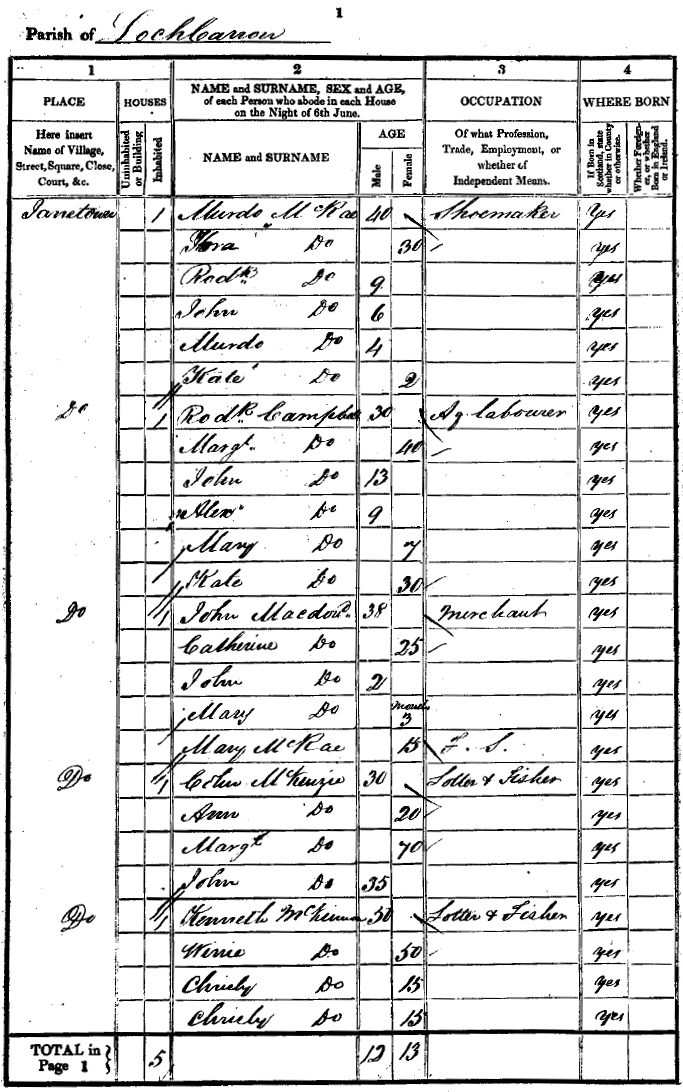
1841 Scotland Census page for Janetown that contains the Campbell family.
A census was conducted in Scotland in 1841. Roderick, Margaret, Alexander as well as Alexander's siblings, Mary and John, were recorded
as living in Janetown. Roderick and Margaret had three other children, all daughters, including their daughter Margaret born in 1826,
but the girls' fate is currently unknown. They are recorded as deceased on Alexander's mother's 1854 death certificate.
In 1846 potato blight hit Janetown. Simultaneously the herring fishery collapsed. These two events brought
famine to the village. The severity of the famine was noted by government and church officials and relief was organised.
Through unknown circumstances, the surviving members of the Campbell family found their way from Lochcarron to Plymouth where they
embarked as government assisted emigrants on the Harry
Lorrequer on 21 September 1849 in steerage. The Harry Lorrequer arrived in Port Adelaide, South Australia, on 26 December
1849. As with most immigrant ships to South Australia, the passenger list was transcribed in the South Australian Register. Alexander had his 19th birthday 10 days
before he arrived in the Colony of South Australia.
The McDonald family in Scotland
Isabella McDonald was born around 1831 in the Parish of Kilmuir on the island of Skye. Isabella's father was Duncan McDonald and her
mother was Marion McDonald (nee McDonald). Isabella likely spoke exclusively Gaelic during her early life on Skye. The McDonald family
likely worked for or sublet land from one or more crofters on the north-west coast
of the Trotternish Peninsula near the places then known as Score and Lachasay. The family would have been referred to as cottars as they did not directly rent land from the landowner. As with many
agricultural families on Trotternish, the land on which they lived was owned by the head of Clan MacDonald of Sleat, absentee landlord Godfrey William Wentworth
Bosville–MacDonald, 4th Baron MacDonald, often referred to as Lord MacDonald.
Isabella was living at Score with her mother Marion and her siblings Donald, Flora, Alexander, Angus, Margaret and Archibald on the
day of the 1841 Scotland Census. Her father Duncan is not recorded at their home in
that census.
The 1840s were a difficult
period for people living on Skye. When the 1851 Scotland Census was taken, Isabella, her older sister Flora, and a cousin Mary, were
living in a bothy in Dirleton, East Lothian, working as agricultural laborers. Dirleton is
260 miles of walking from Score. Isabella and Flora would have been sent away from home to earn money to sustain the family at
Score.
The Emigration of Highland Crofters Under the Auspices of the Imperial Government
When the emigration was set on foot, the people had become so reduced in circumstances that many of the selected emigrants reached
Glasgow in a condition little better than nudity, and were unable to proceed further until supplied with the necessary outfit,
clothing, etc., by the Agents of the Highlands and Islands Emigration Society.
The poor people were, themselves, utterly helpless; every thing had to be done for them. Without money, without clothes or shoes,
many of them without any knowledge of the language spoken by the people with whom they would have to deal at every stage of their
long journey, these emigrants could not have left their wretched homes had there not been extraneous funds to cover the whole
expenditure of the emigration.
During this period London–born and Eton–educated Bosville–MacDonald began selling off his land on Trotternish to pay his creditors.
Crofters and cottars, including Isabella's family, were cleared from their land to make way for sheep farms. The Highland and Island Emigration Society was formed and funded
to facilitate emigration of cleared families to Australia. A condition of the sponsored emigration to Australia was that Isabella's
family, once in Australia, repay their debt to the HIES.
Isabella and her family departed Liverpool on the Priscilla on 15 October 1852. On 19 January 1853, following a harrowing
voyage with much loss of life, they arrived at the quarantine station at Point Nepean in the newly created Colony of Victoria. The
family owed £47 12s 11p to the HIES and were listed by the HIES as a "Very poor family but a good one for Australia."
Isabella was about 22 years old when she arrived in Australia.
Alexander Campbell Arrives in Victoria
The Campbell family lived and worked in South Australia for about one year. Alexander later claimed to have worked on a sheep station
during that time. His occupation is listed as "shepherd" on the
Harry Lorrequer shipping list.
Around 1851 to 1852 the entire family — Roderick, Margaret, John, Alexander and Mary — moved to Victoria.
Mary Campbell married Farquhar McRae in the Manse of the Scots' Presbyterian Church in Melbourne
on 13 October 1853, moved back to South Australia with her husband, and became matriarch of a very large and successful family.
In February 1854 Roderick sustained a fatal injury. He was riding on the rail of a dray near present–day Coburg, fell off, and was
run over by the wheel of the dray. He was transported to hospital in Melbourne, but died a few days later. John signed as the informant
on the inquest
document and Alexander signed as the informant on the death certificate. The Argus reported:
The other inquest: was on the body of Roderick Campbell, who, as the jurors found by their verdict, was "accidentally killed in
consequence of being jerked from the pole of a certain bullock-dray whilst in motion, whereby he was so severely injured by the wheel
of the same passing over his right thigh and arm, and that after lingering four or five days he expired." A son of the deceased
proved the facts set forth in the verdict, and that his father was sixty-five years of age.
Roderick was buried in an unmarked paupers grave in the Roman Catholic section of what is now called the Melbourne General Cemetery.

Roderick Campbell's death certificate.
Three months later, on 5 April 1854, Margaret Campbell (nee McRae) died in Moonee Ponds. John Campbell signed as the informant on
his mother's death certificate. Margaret's place of burial was not recorded.
Isabella's early days in Victoria
The Priscilla's voyage had been particularly lethal, even by the standards of the day. Thirty one immigrants had died on board,
and a further 11 died at the quarantine station. The Argus reported:
The Priscilla, which left Liverpool October 15th, arrived at the Port Phillip Heads January 19th [1853], since which time she has
been in quarantine on account of the number of deaths that had taken place, which were as follows: 12 adults, 24 children, and 5
infants, principally from general causes. The classification of the emigrants now on board is as follows: 34 married men, 32 married
females; 44 single men, 58 single women, and 66 children: 3 married men, 3 married women, 1 single man, 7 single women, and 16
children, still remain on board the Lysander, at the Sanitary station, but all are convalescent. The Priscilla brings no cargo for
this port, but coals for Bombay.
The Priscilla cleared quarantine and arrived in Melbourne on 24 February 1853. All members of the McDonald family that were
aboard — Duncan, Marion, Alexander, Isabella, Angus, Margaret and Archibald — survived the journey to Melbourne.
There were two "Isabella McDonald's" on the Priscilla; one stayed with her family on landing, and the other was contracted to work
for a Mr Lane in Gisborne.
Marriage and children

Alexander Campbell and Isabella McDonald's marriage certificate.
Isabella and Alexander were married in the manse of the Scots' Presbyterian
Church in Melbourne on 14 September 1855 by Irving
Hetherington. Alexander and Isabella were both residents of Keilor; Alexander working as a bullock driver and Isabella as a
servant. On his marriage certificate Alexander solemnly declared that he was a member of the Church of Scotland, which he was not. Alexander made a few attempts to sign his
name, which he eventually did. Isabella signed with her mark.
Nine months and 10 days after their marriage, Alexander and Isabella's first child, Margaret, was born in Keilor on 23 June
1856.
Within a few years Isabella and Alexander moved to Newham along with many of Isabella's siblings and their spouses. John Campbell,
Alexander's brother, lived nearby at Woodend.
In 1857 John Campbell purchased 200 acres of Crown Land near Mount Macedon, and added Alexander's name to the deed. It would later
be revealed that Isabella was unaware that her husband held this land with his brother.
In 1858 Alexander and Isabella's first son, Kenneth, was born (his birth was likely not registered). In 1860 their third child,
Roderick, was born.
Isabella's father, Duncan, died in Newham on 16 June 1860 and was buried in Kyneton Cemetery. The death certificate for Isabella's
mother, Marion, is yet to be located, however she was not noted as deceased on her husband's death certificate.
Alexander Campbell deserts his family, three times
Around the birth of Roderick, Alexander Campbell decided to try his luck prospecting for gold on the Lachlan River diggings near
present–day Young in New South Wales. From 1860 through to 1862 he was absent, neither writing to Isabella or remitting money. He had
effectively abandoned his wife and their small children. In 1862 a warrant was obtained for his apprehension and he returned to Newham.
Effie Campbell, his granddaughter, recounted that her grandmother,
Isabella, was milking a cow and saw him coming down the road and took him back in.
Shortly after his return, Isabella and Alexander's fourth and final child, Alexander Duncan Campbell, was conceived. However, prior
to Alexander Duncan's birth (26 May 1863), his father decided to return to the Lachlan to seek gold, again leaving Isabella alone with
her young family.
This time Alexander did remit money and write to Isabella, though after a few years the letters and money stopped. Effie Campbell
recalled that she was told Isabella never saw Alexander again, however their paths did in fact cross again, almost a decade later, when
Alexander Campbell returned to the district in 1872.
The subsequent court case made the newspapers throughout Australia as a
comedic piece on the parsimoniousness of Scots:
The matrimonial troubles of the Campbells occupied the attention of the Woodend bench for a long time on Monday morning. Mrs.
Isabella Campbell charged her husband, Alexander Campbell, with deserting her, and leaving her and her four children without means of
support, and the tale that she told was a pitiful one. Twelve years ago her husband went away to seek his fortune on the Lachlan
diggings, leaving his wife and three children settled upon a small piece of land at Newham, the property of Mrs. Campbell's brother.
Two years elapsed, and as the husband neither returned nor contributed to the support of his family, a warrant was obtained for his
apprehension, but when the truant was brought back the heart of his wife relented; the husband promised to be faithful in future, and
the two lived comfortably together for some months.
Campbell, however, soon grew tired of home, and once more bent his stops to the Lachlan, promising faithfully to send for his wife
as soon as he had made his pile. At first he used to write regularly–"such loving letters," Mrs. Campbell told the bench–and remitted
several sums of money; but the letters and remittances gradually got less frequent, and at last ceased altogether; whilst, to make
matters worse, the brief visit home of the husband had added another to the family, and the wife had now four children dependent upon
her exertions for support.
For seven years she had managed to keep them and herself from actual starvation partly by tilling the little plot of ground upon
which she was living, partly by going out to work, and partly by the kindness of the neighbours, many of whom were in court willing
to bear testimony to the excellent character of the deserted wife. To add to her misfortunes, her house and furniture were destroyed
by fire about twelve months ago, and she would have been absolutely homeless, but for the kindness and sympathy of some of the
residents of Newham.
It appeared that her husband was the owner–with his brother–of a farm of 235 acres, which had always been let, though no portion
of the rent was ever received by the wife. The bench ordered security to be found for the payment of 10s. a week; but Campbell said
he would live with his wife and support her. Against this arrangement, however, Mrs Campbell vehemently protested, and offered to
take 6s. a week if the bench would make the order so that she could get the money without the husband. When it was explained that no
such order could be made, the friends of the parties concluded an arrangement by which Mrs. Campbell undertook, upon the receipt of
£20 in cash, not to seek maintenance from her husband for the next six years, and to withdraw the summons. One–sided as such an
arrangement was, it was gladly acquiesced in by the wife; and at its conclusion, the husband jeeringly told her that she had made a
fool of herself, for that he was about to sell his farm, and that she would not be able to get a penny of the money.
Kyneton Guardian, 5 June 1872
Isabella's remaining years
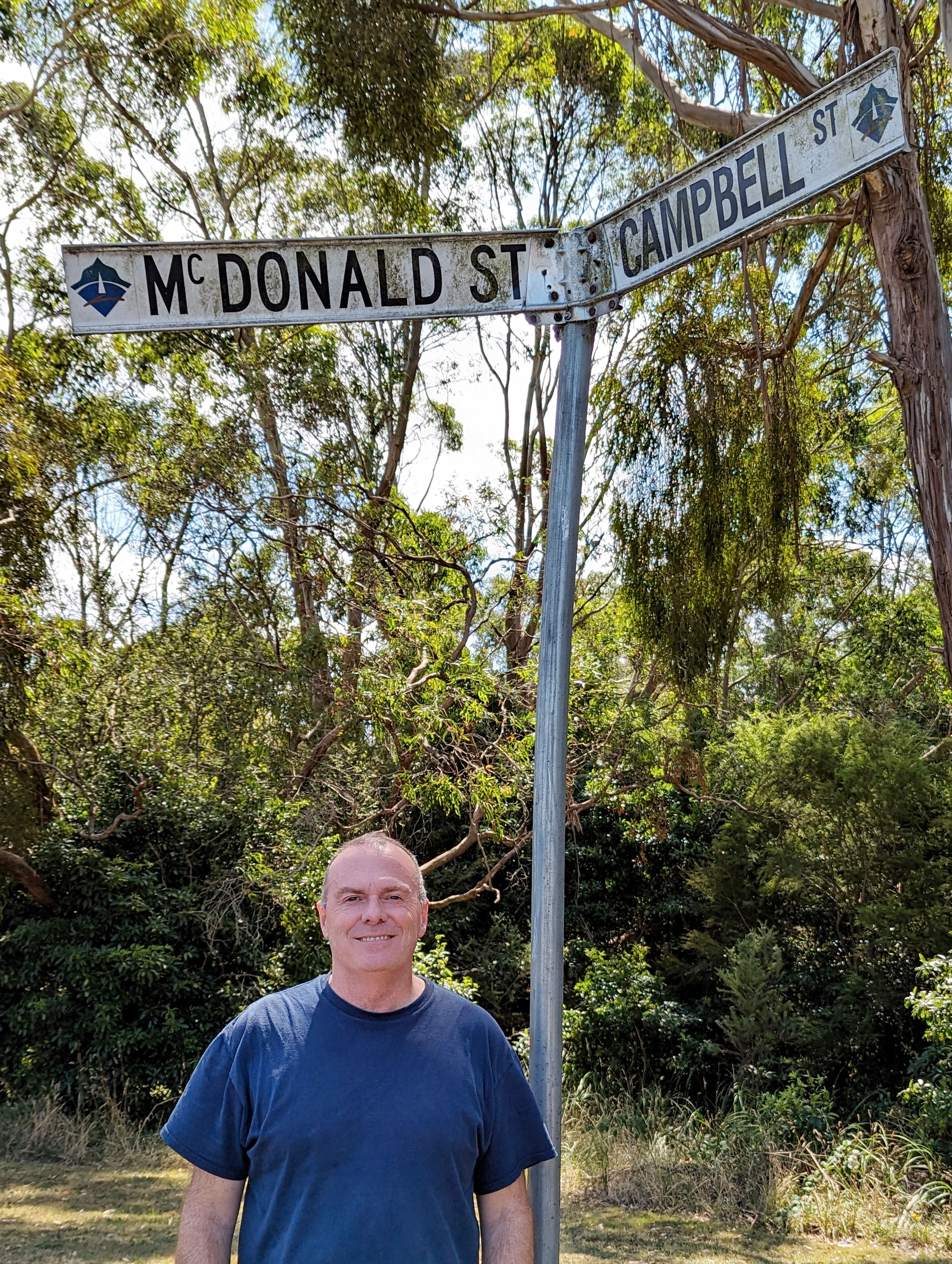
Me, great great grandchild of Alexander Campbell and Isabella McDonald at Meeniyan in 2024.
Isabella became a midwife while at Newham. Isabella's name appears in the Kyneton Guardian in 1874 when Roderick McKinnon (possibly her
sister Flora's brother-in-law) was released from the Yarra Bend Lunatic Asylum and returns to Newham and threatens to kill Isabella.
Amongst other things he had threatened to kill her, cut her liver out, and fry it on the pan. He complained of witches and devils,
and had threatened to shoot her, and to chop her in pieces with an axe.
Isabella's children eventually married, and around 1884 her sons and some of her McDonald siblings and their families moved to
Meeniyan in Gippsland. Isabella's daughter Margaret, and Margaret's husband Norman McLean, moved to Numurkah. It's very likely that Isabella moved to
Meeniyan with her sons; her name appears in the 1908 and 1909 Electoral Rolls for Meeniyan.

Isabella McDonald's death certificate.
By 1913 Isabella was living with her daughter and son–in–law in Numurkah, where she died at age 83 on 23 November 1914. She was buried
at Numurkah Cemetery.
Alexander steals from brother, leaves Victoria
Alexander made the newspapers a final time before departing Victoria. The Mount
Alexander Mail on Monday 22 July 1872 carried the following story:
Castlemaine Circuit Court.
July 20, 1872.
(Before his Honour Judge Williams.)
STEALING DEEDS
Alexander Campbell (on bail) was arraigned on the charge of having on July 3rd stolen two deeds of certain land at Woodend from
his brother.
Mr Byrne, instructed by Mr Bayne, of Kyneton, defended the prisoner. The crown prosecutor stated the case to the jury, and called
John Campbell, who deposed: Am a miner living on my own land at Woodend; recollected purchasing a block of land, 200a 2r 18p, at
Mount Macedon, [section II, allotment 18], parish of Newham, county of Dalhousie, on 13th July 1857. The land was bought in the name
of witness and his brother (the prisoner.) For the sake of his mother the witness put the name of his brother in the Crown grant;
paid for the land himself; prisoner did not pay a sixpence towards it; a mortgage was executed by my brother to me; I had it on my
possession on Tuesday, 5th July; I lodged the Crown grant (produced) with the mortgage deed in the bank of N.S.W. Kyneton; I got them
out of the bank on the 2nd of this month; that mortgage deed was part of the property stolen from me on the Wednesday morning. I
slept that night at Mr Byer’s public house at Woodend; I went to bed about half–past twelve; the deeds were in a paper parcel tied
with string; my brother (prisoner) slept in the same room, in a separate bed; on waking found the parcel gone — this was before
daylight. I have not got back the mortgage deed.
(His Honour said that the prosecution must give notice to produce the mortgage deed — they must not give secondary evidence of
it.)
There were two pieces of parchment in the parcel; I missed them about half an hour before daylight; I examined my brother’s bed
and found he had gone; gave information to the police and followed him, overtaking him about four miles from Woodend. I asked him for
the deeds and he refused to give them up, when I gave him in charge to the trooper. We all then returned to Woodend. Cross–examined
by Mr Byrne: The paper in your hand is only the wrapper; I put my brother’s name in the Crown grant out of good will; my brother was
with me when I purchased the land; I had been staying at Byer’s for three weeks before the robbery, during which time I spent over
£100, honestly and respectably; I took the deeds out of the bank to raise more money on them; my brother could not raise money on
them but I could; about 14 years ago I and my brother worked for Mr Mooney, both he and I used to draw the money; the room was dark
and finding my deeds gone I alarmed the landlord.
Thomas Sampson, Mounted–trooper, stationed at Woodend: Received information from last witness about the robbery, and in company
with him, rode to the Hanging Rock, where we overtook the prisoner. On asking the prisoner for the deeds he said he had only taken
what he was entitled to, and there was no such thing as a mortgage bond in existence, adding that the Crown grant was where his
brother would have found it. I arrested him and brought him in to Woodend; prisoner gave an order addressed to Mrs McKenzie to give
witness all documents left in her possession by him. Mr McKenzie saw the prisoner had a conversation with him after which the deeds
were given up.
J. Campbell, recalled by Mr Byrne: Was sworn at Woodend, when I stated that I saw my brother come into the room about 2 o’clock;
it was about half past 12. (The deposition were here put in and read.)
His Honour said it only appeared to be a family squabble between the two; the mortgage deed could not be proved without its
production. He then directed the jury to acquit the prisoner. If there was any dispute let the parties fight it out in a civil
court.
The jury accordingly returned their verdict, and the prisoner was discharged.
John then brought a case in civil court against Alexander. Alexander had been borrowing money from John for a number of years using
Alexander's partial ownership of the land as security, and since nothing had been repaid, Alexander's ownership of the land was ordered
sold at auction with proceeds being paid to John.
However, prior to the sale of the land the brothers had hatched a scheme to use the deed as security and take out multiple
fraudulent loans against the property. The loans were typically offered by local publicans to cover the brothers' drink and
accommodation bills at various pubs. The scheme ultimately netted well over £300 and, with angry publicans and the law on their heels,
the brothers fled to Sydney by steamer in October 1872.
There is no record of Alexander returning to Victoria after 1872. John, who had recently returned to Victoria from the New Zealand
gold rush, disappears from verifiable records this year.
Mount Macedon 200 Acres
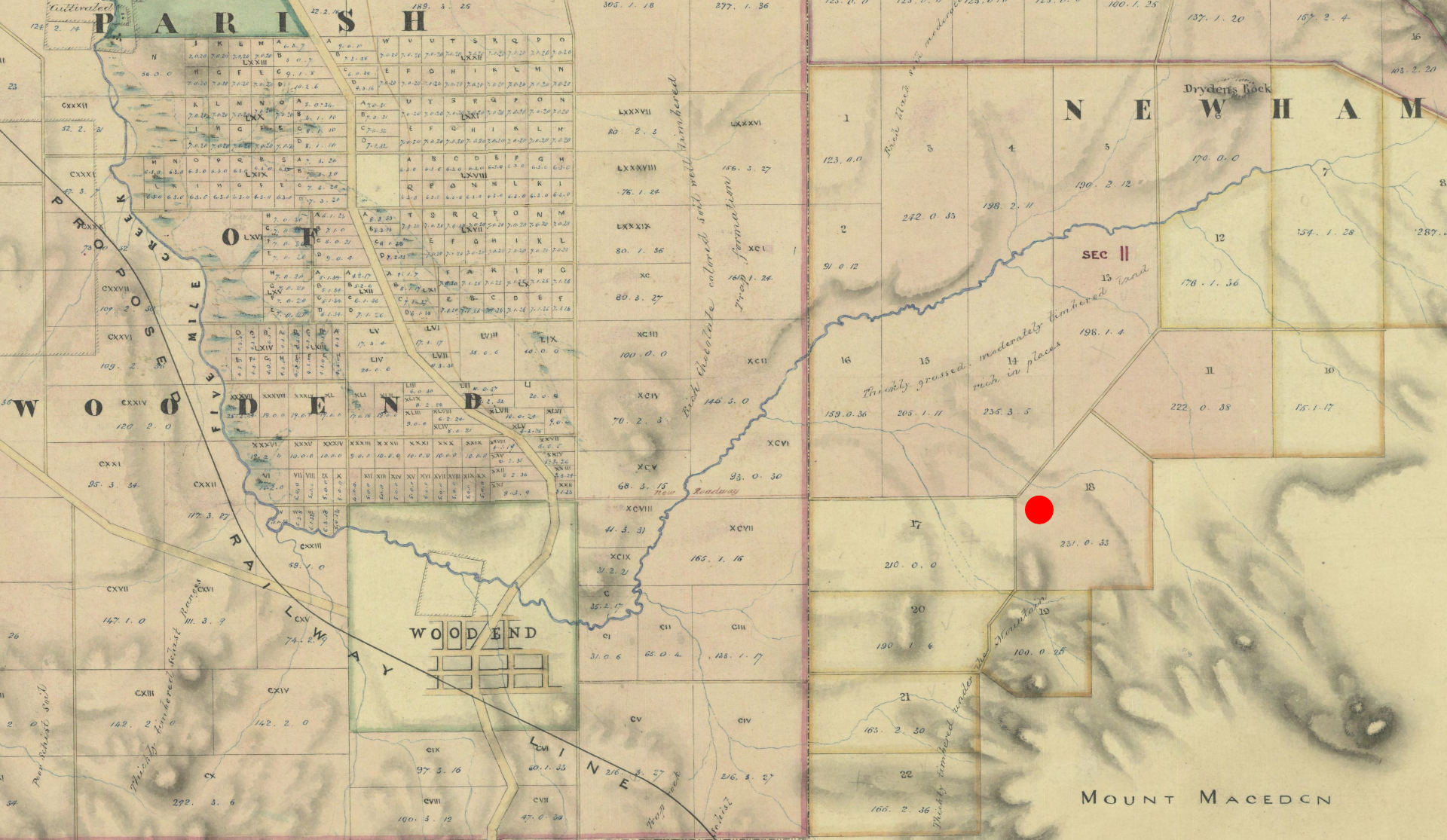
Detail of Parish of Newham showing location of Section II, Allotment 18.
The Public Record Office Victoria has scanned historic land maps drawn up in the early years of the Colony of Victoria. The 200 acres
at the centre of the legal disputes between John, Alexander, and others, was noted as Parish of Newham, Section II, Allotment 18. This
undated map at PROV
shows that land to be about 4km east of Woodend on
a bend in what is now called the Romsey Rd.
All of Alexander's remaining land dealings involved either leasing or purchasing Crown Land titles via allocations from various
Colonial governments (the Colonies in Australia federated on 1 January 1901). Crown Land was land that had earlier been seized from the original inhabitants by European squatters
and settlers. Portions of that land were later brought under the control of "The Crown" via colonial Crown Land Acts. Under those laws land was then surveyed,
divided into allotments, and then sold to European settlers. Alexander took advantage of this theft as it unfolded on the east coast of
Australia.
Palmer's Island Free Selection — 1873–1883
By February 1873 Alexander had obtained a Crown Land selection on Palmer's
Island in the Northern Rivers area of the north coast of New South Wales, approximately 1500km from his family in Victoria. Alexander
began clearing and cultivating land, subsidized by the Colonial Sugar Company (modern-day CSR). His sugar cane was sold to Colonial
Sugar, either cut or standing in the field.
In 1877, while at Palmer's Island, Alexander filed an apparently fraudulent
claim against the estate of a William Campbell, miner, who had died in a drowning accident at Coraki, about 70 km north of Palmer's Island.
William Campbell had no wife or descendants and was intestate. Alexander declared he was William Campbell's second cousin, a claim
for which Alexander had no documentation. It is likely that William Campbell was actually Alexander's brother John, living under a
false name to avoid the legal consequences of the activities that triggered his departure from Victoria.
Alexander's claim was uncontested and he was granted all "goods, chattels, and effects" in probate.
Alexander held the Palmer's Island land until September 1883 when he put it on the market and sold it for £755 to a Duncan McPhee. He later called himself foolish for selling the property.
Crown Land Lease: Sophia 539
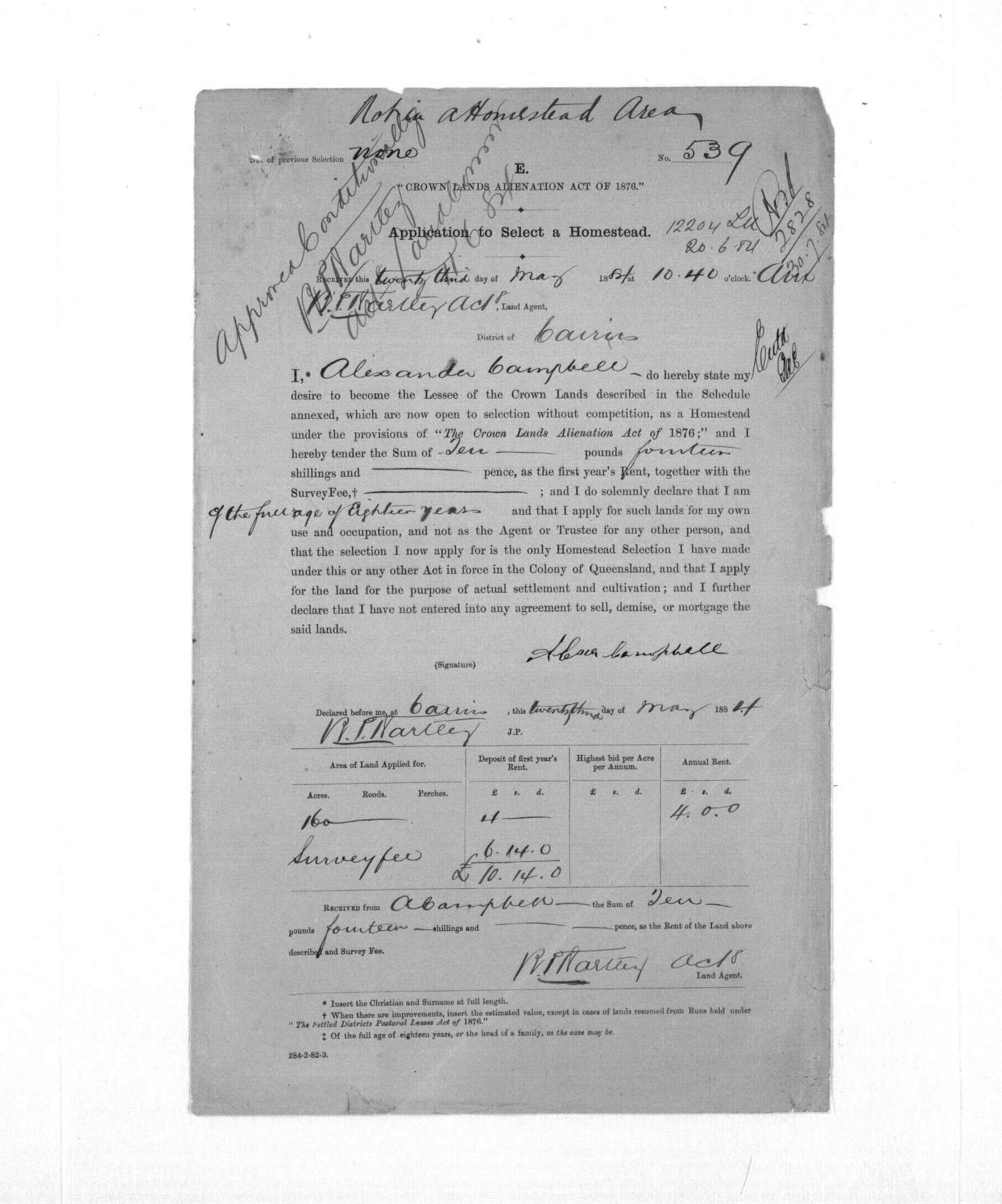
Alexander Campbell's signed application to lease Sophia 539.
On 23 May 1884, Alexander lodged an application to lease 160 acres of Crown Land in Far North Queensland. The land was located on the Mulgrave River, approximately 45km south
of Cairns. The allotment was referred to as Cairns 539, or Sophia 539 (i.e. Parish of Sophia). Upon receipt of Alexander's £10 14s
deposit, and with Alexander agreeing to pay £4 yearly rent, his application was approved.
The lease conditionally allowed Alexander to own the property outright after 10 years. As this was a "Homestead" allotment one of
those conditions was that Alexander reside on the property for that decade. Additionally he was required to improve the property. It
was entirely covered by thick scrub, and portions of the property were noted as inaccessible on the property survey.
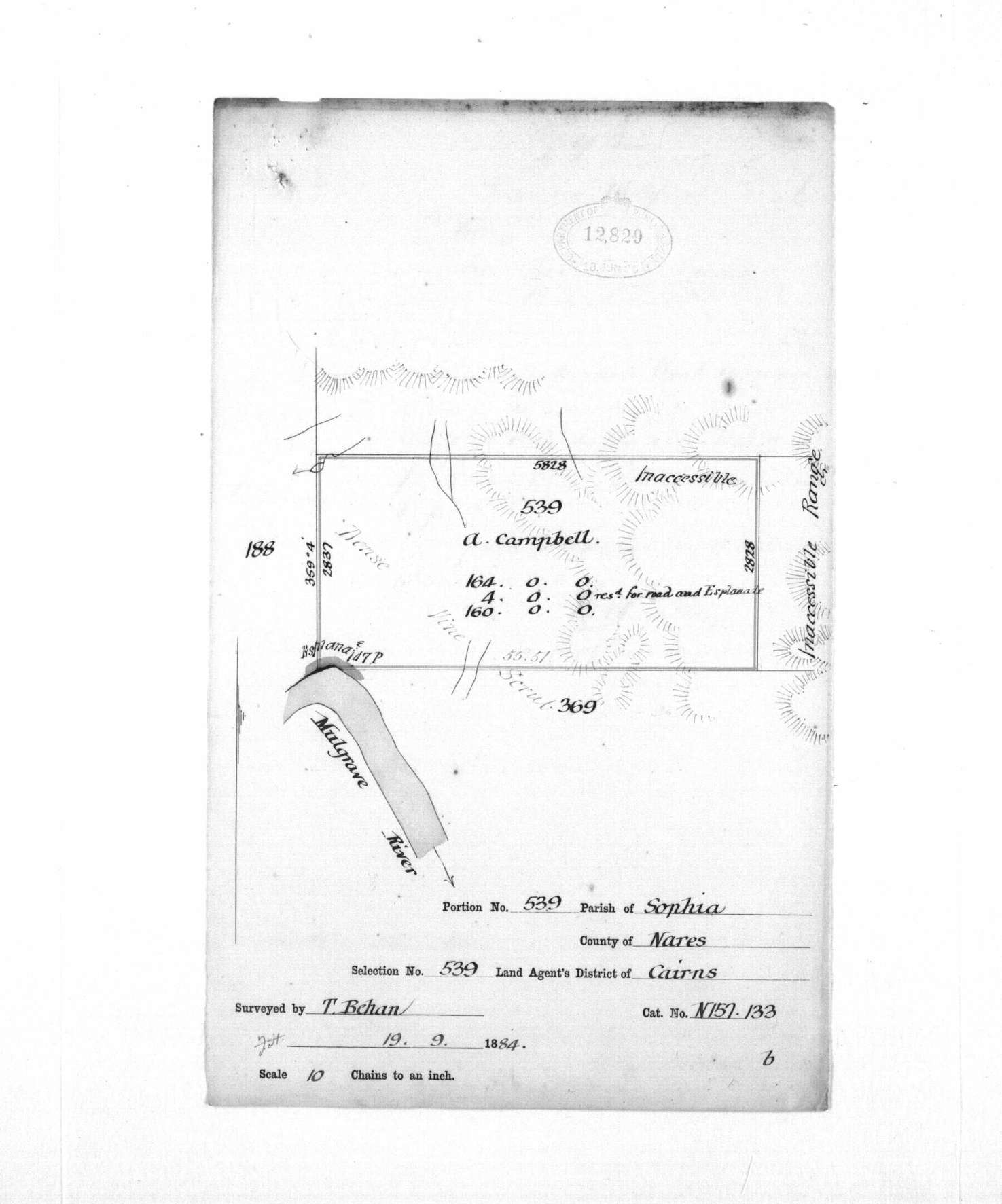
Sophia 539 survey.
After obtaining the lease Alexander immediately relocated back to the Richmond River area of New South Wales and resumed his
employment with Colonial Sugar. This was in violation of the lease condition that he permanently reside on his allotment. In April
1887, three years later, he returned to Sophia 539 and began improving the property. Those improvements included building a simple
shack and clearing about 28 acres of scrub. This work was almost certainly performed by Western Pacific indentured laborers.
Alexander twice lost his right to lease the land for failure to pay rent. Both forfeitures were eventually reversed when he paid the
annual £4 rent plus late fee.
The Crown Land office in Cairns routinely inspected the property and found that Alexander was obviously not in residence and that
few to no ongoing improvements were occurring.
"Act of Grace"
In October 1891 Alexander was in Cairns Land Court attempting to own the property outright. To achieve this he needed the Cairns Land
Court to issue a Certificate of Fullfillment of Conditions. The Court had ample evidence to deny the application for the Fullfillment
Certificate, however Alexander lodged an affidavit and his application was forwarded to the Minister in Brisbane with a request that
the Certificate be granted as an "act of grace." This request was based on Alexander's assertion that he had been wiped out by
extensive flooding on the Mulgrave River in April 1891.
Copy 91 20502
Minutes of Evidence taken at the hearing of the application of Alexander Campbell, holder of Homestead No 539 parish of Sophia,
for a Certificate of Fulfillment of Conditions at the Land Court Cairns, 20 October 1891.
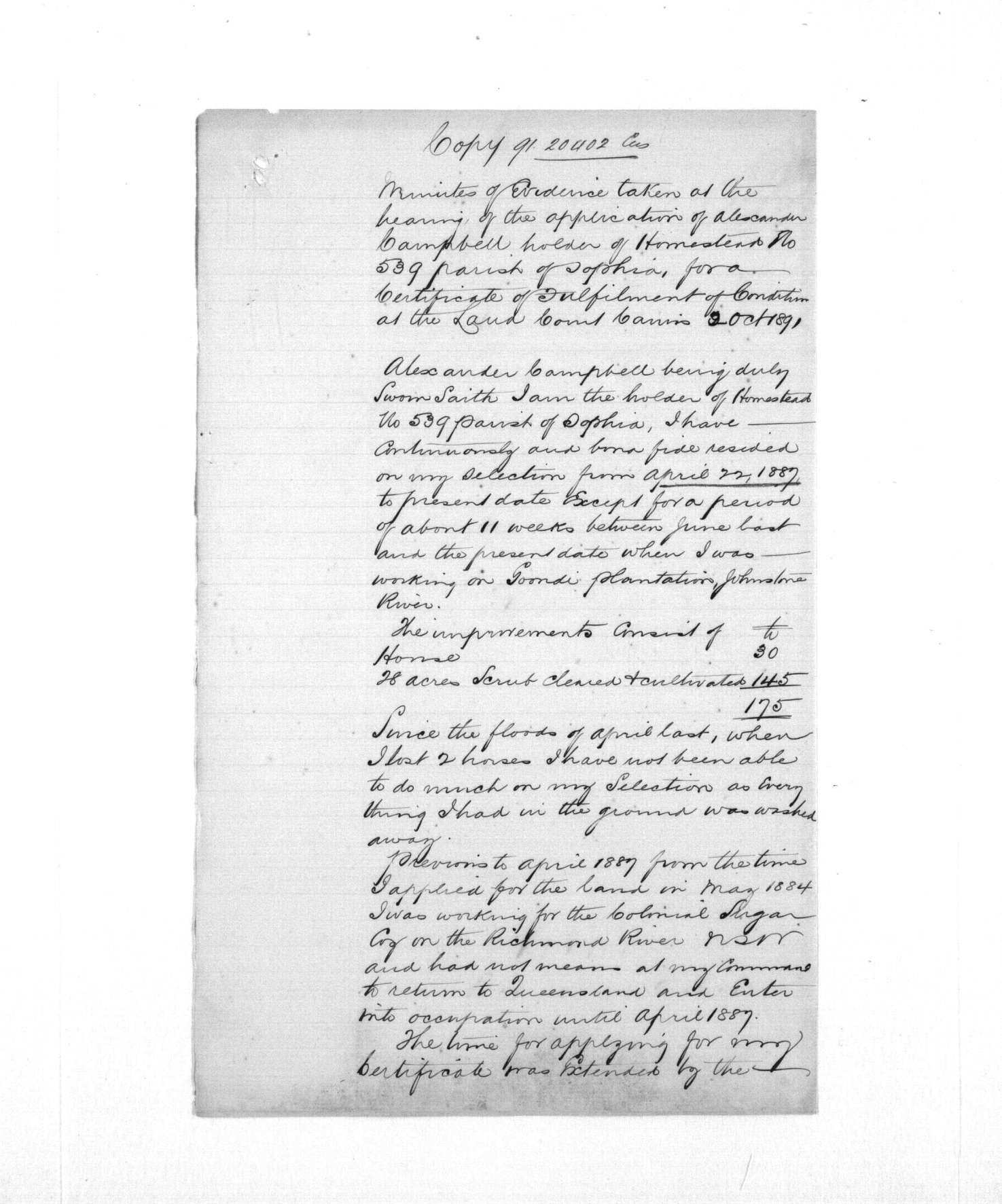
Page 1 of Alexander's affidavit.
Alexander Campbell being duly sworn saith I am the holder of Homestead No 539 Parish of Sophia, I have continuously and bona fide
resided on my selection from April 22, 1887 to present date except for a period of about 11 weeks between June last and the present
date when I was working on Goondi Plantation, Johnstone River.
The improvements consist of house (£30), 28 acres scrub cleared and cultivated (£145), £175.
Since the floods of April last, when I lost 2 horses I have not been able to do much on my Selection as everything I had in the
ground was washed away.
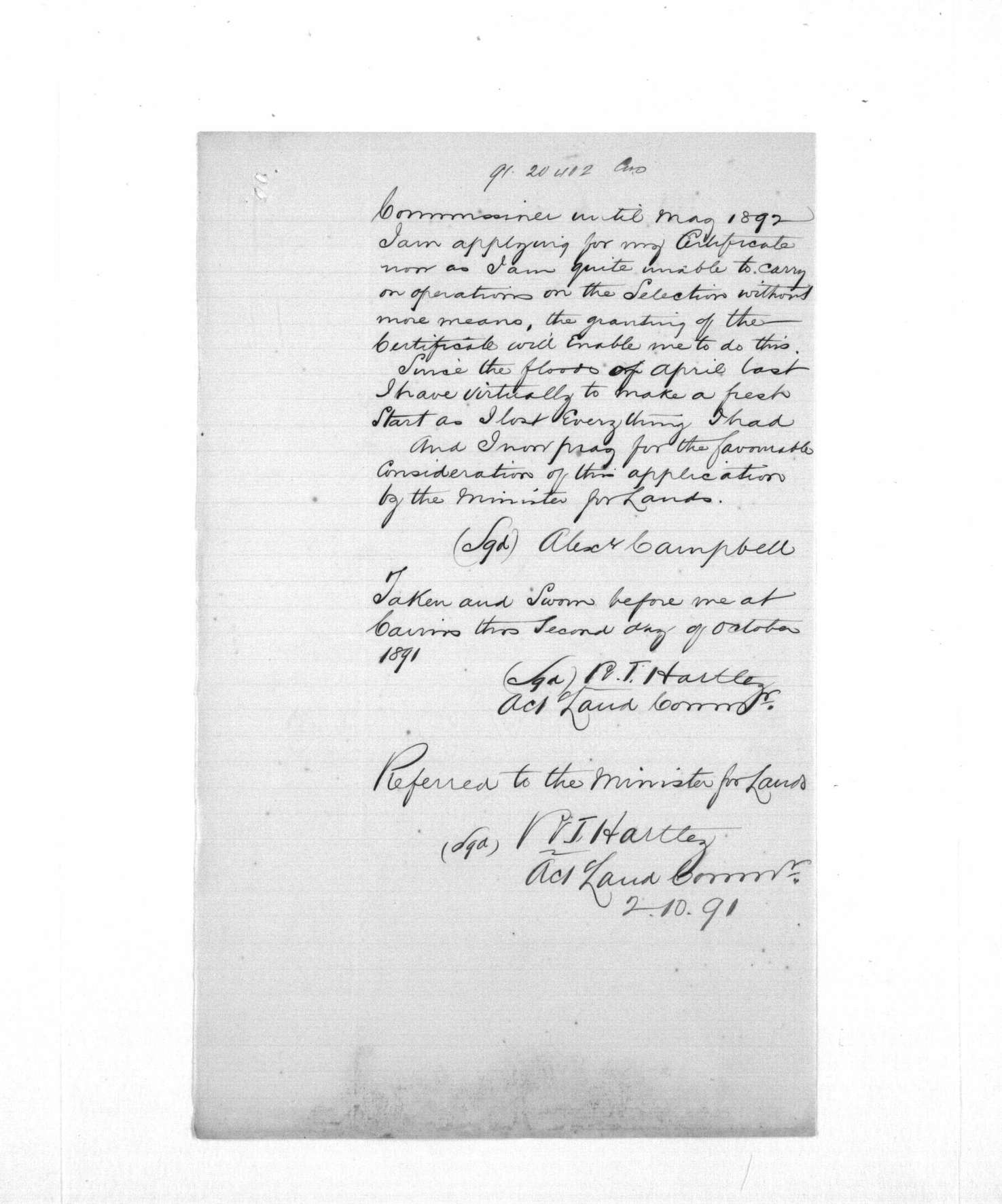
Page 2 of Alexander's affidavit.
Previous to April 1889 from the time I applied for the land in May 1884 I was working for the Colonial Sugar Company on the Richmond
River NSW and had not means at my command to return to Queensland and Enter into occupation until April 1887.
The time for applying for my Certificate was extended by the Commissioner until May 1892. I am applying for my Certificate now as
I am quite unable to carry on operations on the Selection without more means, the granting of the Certificate will enable me to do
this. Since the floods of April last I have virtually to make a fresh start as I lost everything I had.
And I now pray for the favorable consideration of the application by the Minister for Lands.
(sgd) Alexr Campbell
Taken and Sworn before me at Cairns this second day of October 1891.
(sgd) R. T. Hartley Act Land Commr
Deed Issued
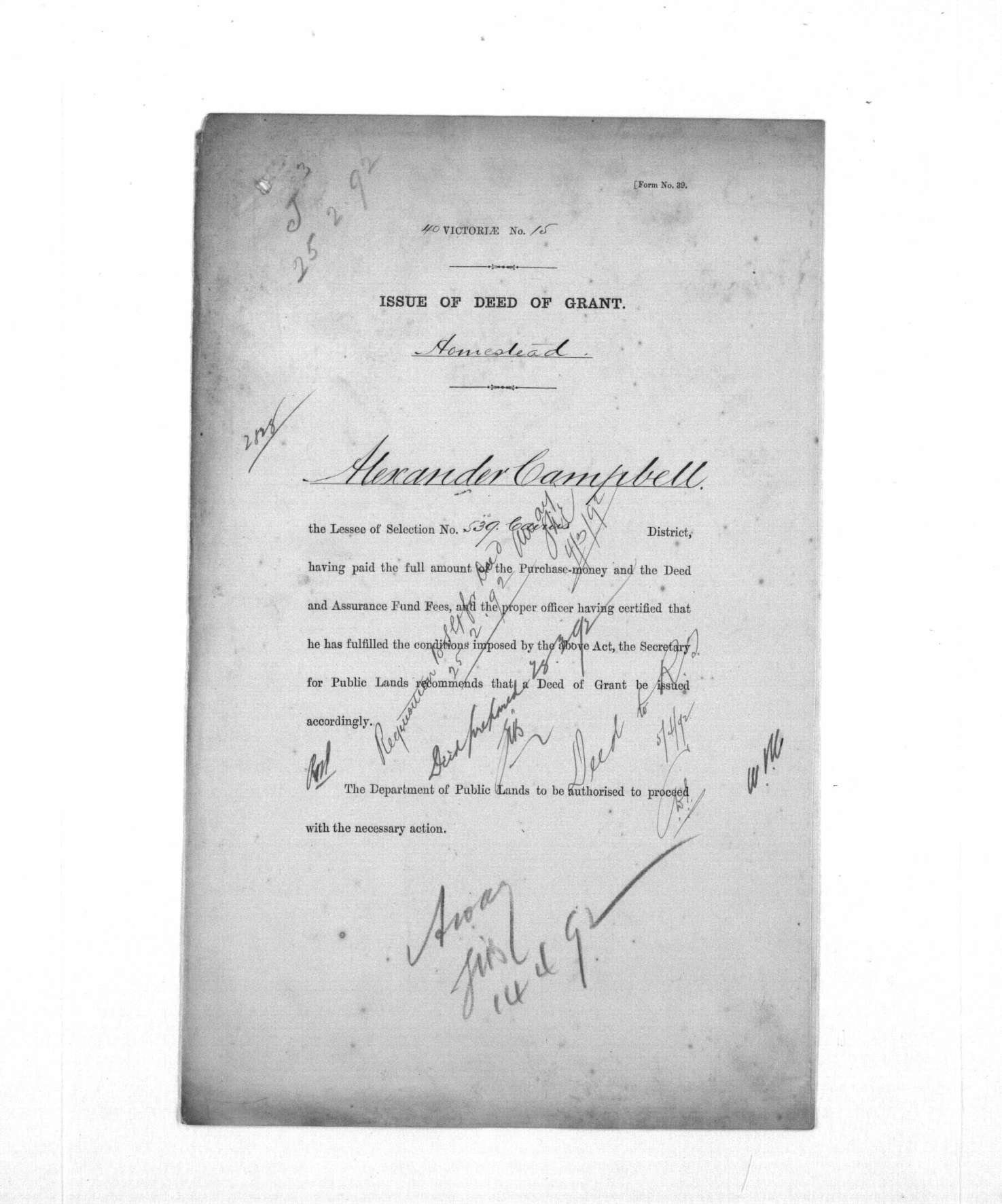
Approval to issue Deed to Sophia 539 to Alexander Campbell.
The Secretary for Public Lands did eventually approve the Certificate of Fullfillment of Conditions and shortly thereafter an order was
issued to produce a Deed for the land, which presumably was forwarded to Alexander. It is unclear what happened to the property after
Alexander finally obtained outright ownership. A small creek through the property is now named Campbell Creek.
Kanaka Ganger: The Geraldton Advocate Interview
In late 1891, Alexander encountered a reporter from the Geraldton Advocate (a newspaper published in Innisfail, Queensland). Alexander
gave a long and candid interview that covered his sugar cane farming activities in Queensland and New South Wales since 1873. The
interview was reprinted in the 3 November 1891 edition of the Mackay Mercury.
In the interview Alexander indicates he had worked as a "kanaka ganger". As such Alexander was an overseer of Western Pacific indentured laborers who were commonly utilized in
the Queensland sugar cane industry through to about 1905. By any standards these laborers worked under highly exploitative conditions,
sometimes characterized as slavery. Alexander claimed to have eight such
workers in his employ over the preceding four years.
Dunwich Benevolent Asylum
On 17 November 1896, Alexander was admitted to the Dunwich Benevolent Asylum on North Stradbroke Island, Queensland. To quote the
Queensland State Archives, the function of Dunwich Benevolent Asylum as defined by the "Benevolent Asylum Wards Act of 1861" was to
provide for poor people who because of age, accident, infirmity or otherwise were unable to care for themselves.
A brief biography was recorded upon admission.
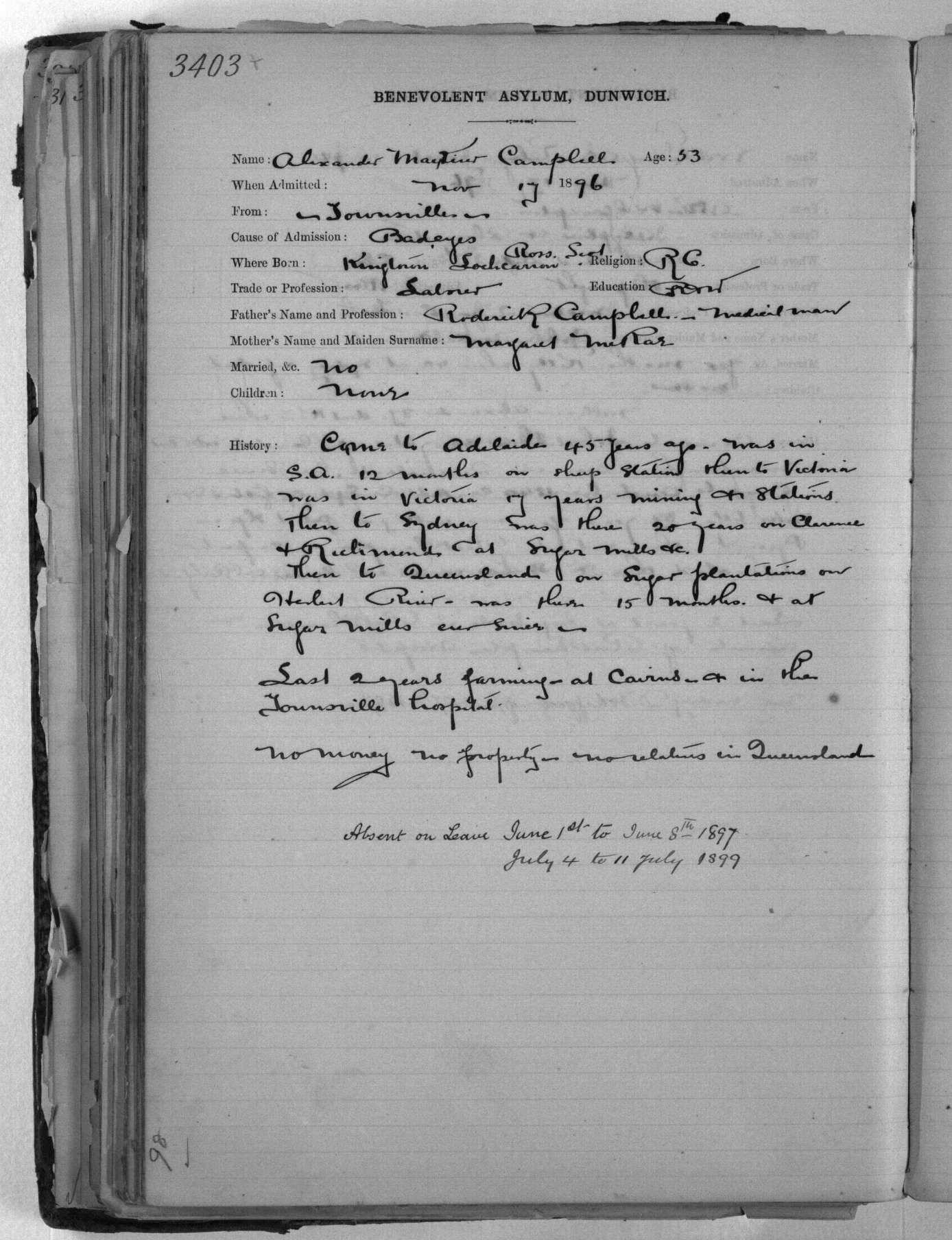
Alexander Campbell's Dunwich admission form.
| Name: |
Alexander Maceiver Campbell |
| Age: |
53 |
| When Admitted: |
Nov 17 1896 |
| From: |
Townsville |
| Cause of Admission: |
Bad eyes |
| Where Born: |
Kingstown, Lochcarron, Ross, Scot |
| Religion: |
RC |
| Trade or Profession: |
Labourer |
| Education: |
None |
| Father's Name and Profession: |
Roderick Campbell — Medical Man |
| Mother's Name and Maiden Surname: |
Margaret McRae |
| Married, &c.: |
No |
| Children: |
None |
History: Came to Adelaide 45 years ago. Was in S.A 12 months on sheep station then to Victoria. Was in Victoria 17 years mining
and stations. Then to Sydney, was there 20 years on Clarence and Richmond at Sugar Mills etc. Then to Queensland on Sugar plantations
on Herbert River — was there 15 months and at sugar mills ever since.
Last 2 years farming at Cairns and in the Townsville Hospital.
No money no property — no relations in Queensland.
Absent on Leave June 1st to June 8th 1897
July 4 to 11 July 1899.
It is unclear that if Alexander had acknowledged that he had a wife and four children in Victoria he would have still been admitted to
Dunwich. Likewise, the disposition of his land in Cairns is unknown. It was accurate that Alexander had no family in Queensland in
1896, however around 1908 his son Kenneth moved from Meeniyan to near Hervey Bay. Family oral history says that Kenneth was unaware
that his father was also in Queensland.
Alexander's Death
After he was admitted in 1896 Alexander appears as a Dunwich inmate in all Queensland Electoral Rolls from 1903 through to his death
on 26 June 1915 at age 83. Apart from a brief leave of absence in 1897 and another in 1899, he spent almost all of his final two
decades at Dunwich.
Alexander's death certificate lists senile decay and exhaustion as the cause of death. He was buried at Dunwich Cemetery, and his
burial is recorded in the Dunwich Funeral Record. It is likely that his
grave is unmarked.
If Alexander was in any type of relationship during his many years of separation from Isabella, no evidence has yet been
discovered.
Campbell/McDonald Family Tree Pages
-
Roderick (McIvor) Campbell, my great-great-great
grandfather, husband of Margaret McRae.
-
Margaret McRae, my great-great-great grandmother, wife of Roderick
Campbell.
-
Alexander (McIvor) Campbell, my great-great grandfather,
husband of Isabella McDonald.
-
Isabella McDonald, my great-great grandmother, wife of
Alexander Campbell.
-
Alexander Duncan Campbell, my great grandfather.
-
Norman McLean Campbell, my grandfather.
-
Wallace Duncan Campbell, my father.
Acknowledgments
Many people and organisations assisted in accumulating the information for these biographies.
































